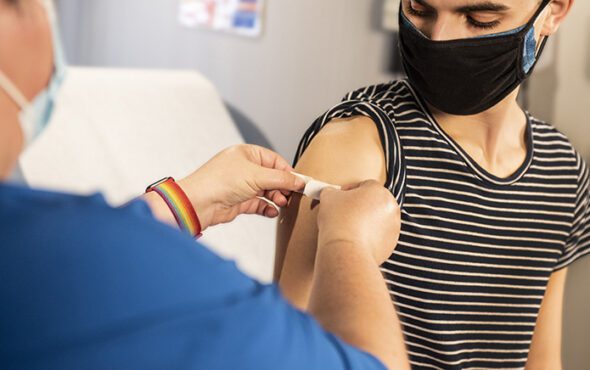
It was recently announced that England’s mpox vaccination programme is no longer needed and will be wound down in the summer, but the UK Health Security Agency (UKHSA) is keeping the situation under close review.
Appointments to receive a first dose of the vaccine will remain available for gay, bisexual and other men who have sex with men at highest risk until 16 June, with bookings for second doses available until the end of July.
The virus, which was formerly known as monkeypox, has seen a sustained reduction in cases across the country from a high of 250 per week in July 2022 to just a handful of cases so far this year.
Now, as the vaccination programme nears its end, GAY TIMES has worked with Terrence Higgins Trust, the UK’s leading sexual health charity, to answer your questions about the importance of getting the vaccine while it is still available.
What is ‘mpox’?
Mpox was previously called ‘monkeypox’. It’s a virus which is related to smallpox but much less contagious and much less severe.
Is mpox or monkeypox new?
No, monkeypox or ‘mpox’ has been endemic – which means it keeps circulating within certain communities – in parts of Central and West Africa for decades. But it’s kind of new for us here in the UK, mainland Europe and the United States. In May 2022 we started to see a significant number of cases in gay and bisexual men, particularly in London.
What can I do to protect myself from mpox?
Well, the good news is there’s a vaccine available and it’s being offered (for free) to gay and bisexual men, other men who have sex with men and people who have sex within those networks.
Where do I get the vaccine?
It’s being offered through sexual health clinics so get in touch with your clinic to find out more. We’re urging people to do that sooner rather than later because the vaccine programme will end this summer. First does will be available until 16 June and second doses will be available until the end of July. Try to make sure you get both so you get the maximum benefit.
What are the symptoms?
Symptoms can vary but it often starts with feeling generally unwell. You might have a fever, headache, aches and pains, swollen glands, chills, or exhaustion. Not everyone will experience or notice these initial symptoms. This usually progresses to developing a rash, sores, or spots. These are most commonly seen on the face, mouth, hands, genitals and the bum. Theses sores can also appear internally. So in the throat, the mucus membranes of the genitals and rectum, which can lead to painful bleeding.
What do I do if I think I have mpox?
Well, first of all – try not to panic. These symptoms tend to be mild in most cases and clear within 3-4 weeks. The advice remains the same; try to take a little break from sex and close intimate contact while you wait to get tested. Call your local sexual health clinic and ask for advice. It’s really important to call ahead and don’t just show up in person.
Is there anything else we should know?
Yes! We’d like everyone to know that in the UK, all sexual health and HIV services are free and completely confidential – for everyone. And to finish – thank you to the community who really jumped into action last year when this outbreak arrived – it’s because of our collective efforts that cases of mpox are low and remain low.
View this post on Instagram
You can find your nearest mpox vaccination site by clicking here.



